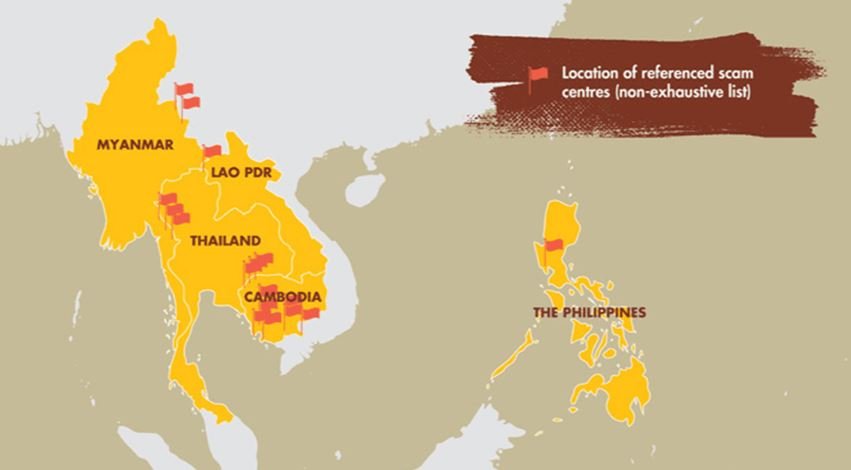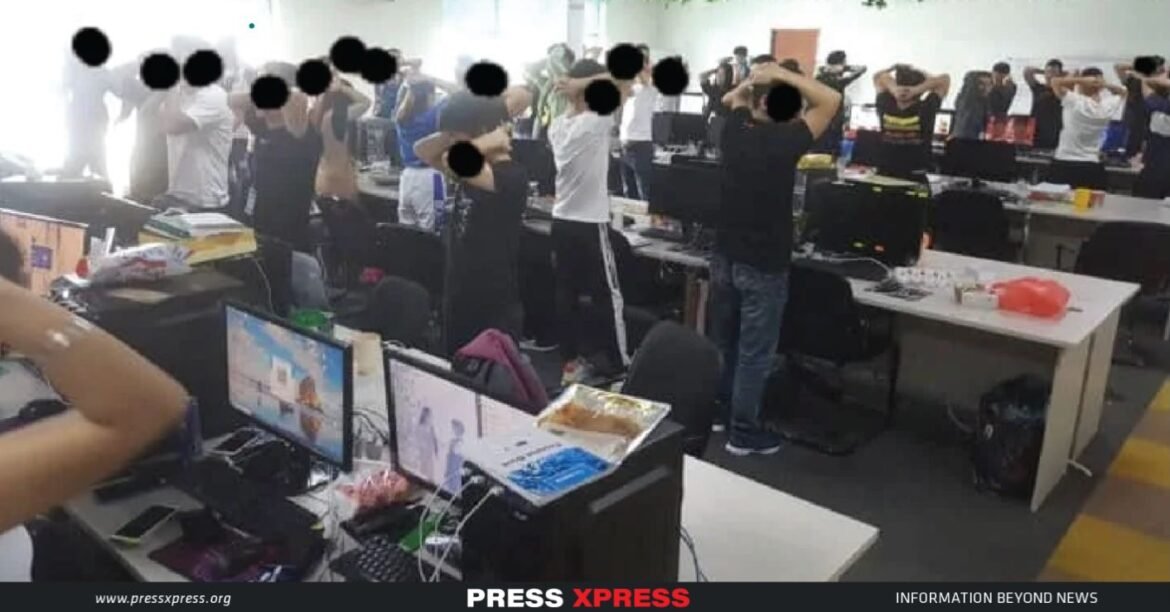With the pandemic opening the door for criminal organizations to exploit vulnerable individuals, it is imperative for nations to unite, revise their laws, and offer substantial support to those impacted
The United Nations estimates that over 200,000 individuals in Southeast Asia are currently falling prey to cyber scams.
A recent report from the Office of the High Commissioner for Human Rights (OHCHR) titled “Online Scam Operations and Trafficking into Forced Criminality in Southeast Asia: Recommendations for a Human Rights Response”, released on Tuesday, sheds light on the immense scope of illegal trafficking within an industry that gained momentum in the wake of the pandemic and displays no signs of abating.
In the context of Cambodia, a minimum of 100,000 individuals are enduring captivity against their wishes, while in Myanmar, “credible sources” suggest that around 120,000 people are similarly held captive, according to the OHCHR’s account. These victims are sourced from various parts of Asia, along with East Africa, Egypt, Turkey, and Brazil.
You Can Also Read: HOW BANGLADESH REMAINED RESILIENT IN MINIMIZING THE COORDINATED CYBER ATTACK?
Typically, individuals respond to job offers posted on social media, enticed by the prospect of well-paying positions in the field of information technology. Such positions usually necessitate relocating from the candidate’s country of origin.
However, the reality they encounter upon arrival starkly contrasts with the enticing promises. Frequently, these workers find themselves confined within compounds alongside fellow trafficking victims, their passports confiscated, and they are coerced into executing online scams. Among these scams, the “pig butchering” schemes stand out, wherein the victims establish rapport with targets on messaging applications, cultivating their trust, and deviously luring them into investing in fraudulent cryptocurrencies.
According to estimates from the United Nations, the scandal in Southeast Asia has generated billions of dollars in revenue. This wave of trafficking initiated during the COVID-19 lockdown period, a time when casinos, which were a significant income source for organized crime syndicates, were compelled to shut down operations.
As the lockdown created new operational circumstances, criminal gangs shifted their focus towards migrant workers who found themselves stranded in foreign countries due to closed borders and halted businesses. These criminal groups coerced these individuals to engage in fraudulent activities from scam centers, as outlined by the UN Human Rights Office.
Concurrently, the pandemic-induced confinement of millions of people to their homes, leading to increased online activity, made them susceptible targets for online fraud.
Upon the reopening of borders, these gangs found a labor pool rendered vulnerable by circumstances, and they capitalized on the ongoing economic challenges provoked by the pandemic, enticing many to seek alternative livelihoods.
Taking advantage of the political instability in Myanmar following a military coup in February 2021, organized crime entities expanded their operations into lawless areas along the borders with Thailand and China. The United Nations has pinpointed Laos and the Philippines as notable hubs for cyber-related trafficking.
China, Thailand, Laos, and Myanmar recently established a collaborative center in the northern Thai city of Chiang Mai, aimed at coordinating regional efforts against cybercrime. In addition, the Chinese ambassadors to Thailand, Laos, and Myanmar issued a joint statement last week, highlighting their joint commitment to combating gambling syndicates.

Insufficient Safeguarding
Even for those who manage to break free from the confines – often through the intervention of anti-trafficking organizations, rescue operations, or ransoms provided by their families – their challenges persist.
While all Southeast Asian nations adhere to the U.N. Trafficking in Persons Protocol, which establishes a framework to define and address trafficking, local legislations frequently fall short when it comes to safeguarding individuals ensnared in cyber scam activities.
A case in point is Thailand, where the National Police estimated that 70% of trafficked individuals who returned to the country for involvement in cyber scams faced prosecution for the crimes they were accused of. Although the country’s anti-trafficking laws grant exemptions to victims from prosecution for certain offenses, scamming does not fall within that scope.
“The legal definition of trafficking in all Southeast Asian countries, except for Malaysia, does not encompass coerced criminal activities as a motive for exploitation,” highlighted the UN report. Moreover, those who have been rescued often find themselves detained, such as in Cambodia, due to violations of immigration laws. They struggle to demonstrate that their entry into the country was orchestrated through deceit and that they were held against their will.
The authors of the report put forth recommendations for national legislation to address the distinct facets of cyber-related trafficking, frequently initiated through voluntary border crossings. Additionally, the UN agency urged local law enforcement agencies to extend assistance to victims rather than bolstering illicit enterprises.
“Victims also recounted instances where law enforcement personnel directly abetted their traffickers, such as facilitating cross-border travel or serving as guards at scam centers,” the report underscored.
“States bear the responsibility of combatting corruption as part of their broader commitments to human rights, the advancement of good governance, and upholding the rule of law.”
Conclusion
The stark reality of cyber scams sweeping through Southeast Asia is a dire call for attention and action. With the United Nations estimating that over 200,000 people have been ensnared in this modern form of exploitation, the urgency to address this issue is undeniable. As the pandemic paved the way for criminal organizations to target vulnerable individuals, the need for comprehensive legal protection and cross-border collaboration has become evident.
The report from the Office of the High Commissioner for Human Rights (OHCHR) underscores the pressing need for regional cooperation, legislation tailored to the complexities of cyber-related trafficking, and a commitment to human rights. The challenges faced by those who manage to escape the clutches of cyber scams and then fall victim to legal loopholes or corruption demonstrate the depth of this issue.
To truly combat this epidemic and protect the rights of millions, it is imperative for nations to unite, amend legislation, and provide comprehensive support to those who have suffered. Only through these collective efforts can Southeast Asia hope to dismantle the chains of cyber exploitation and pave the way for a safer, more just future for all.
(Based on the Report from OHCHR)


